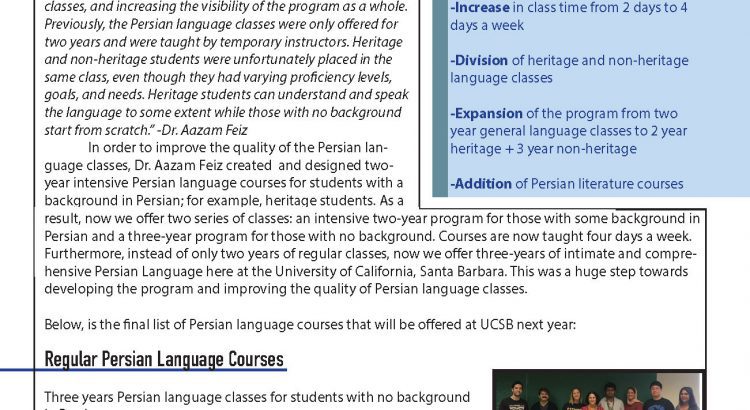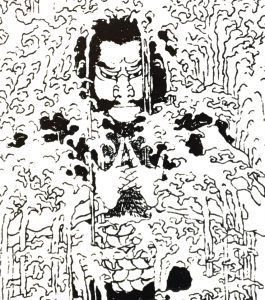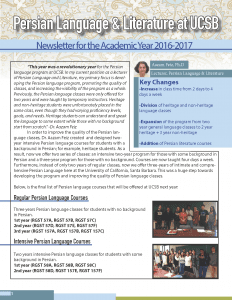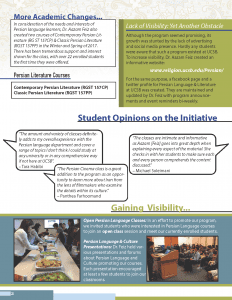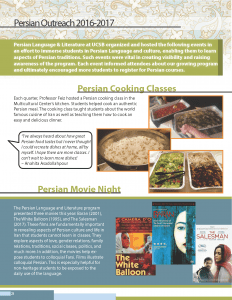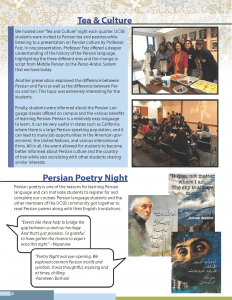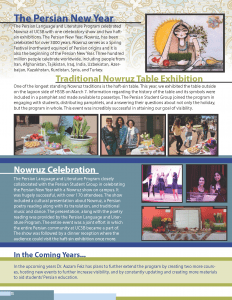Please visit the Persian Language site to download the 2016 – 2017 Persian Newsletter.
News
Learn Turkish and Discover Turkish Culture
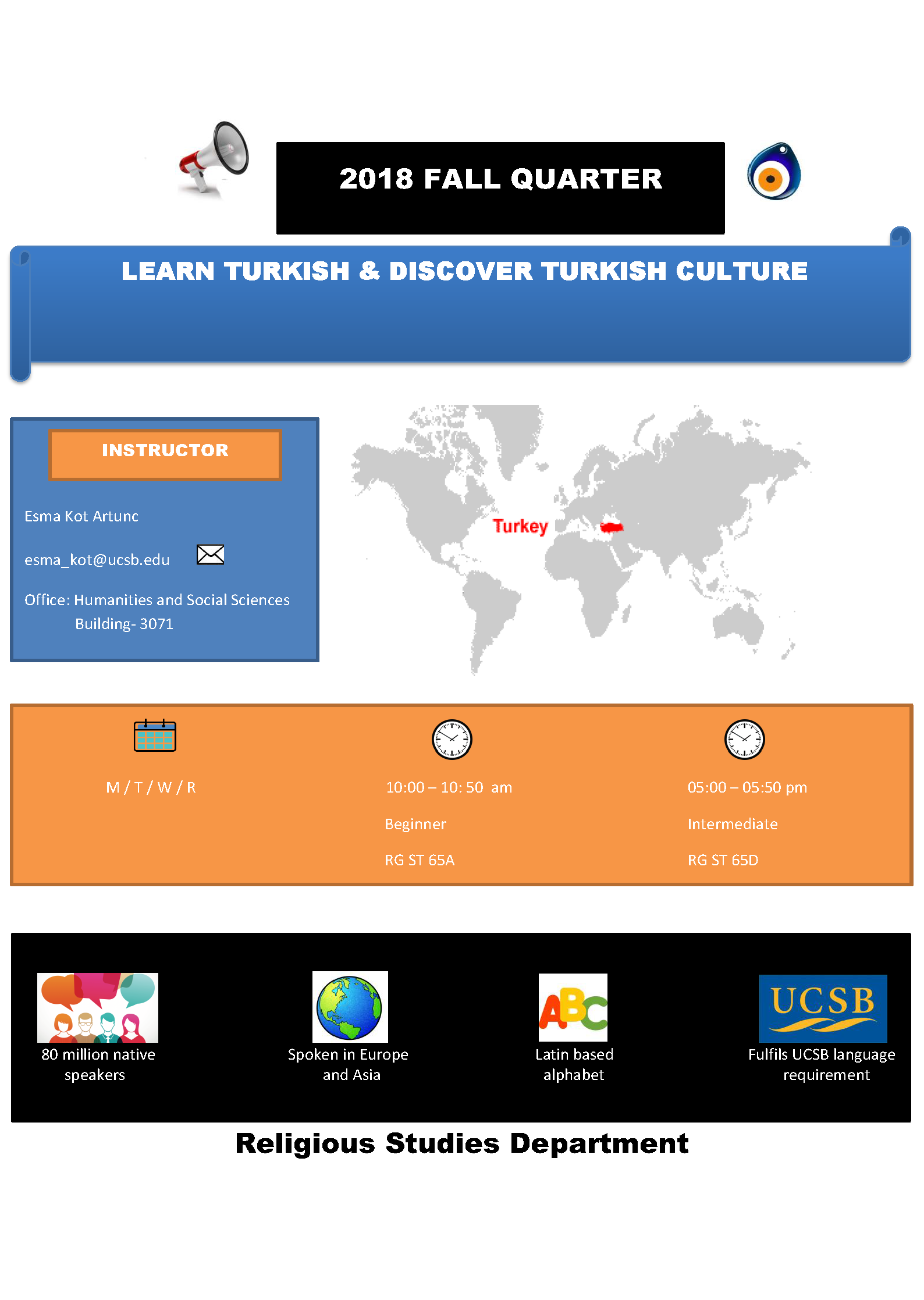
“Why Study Religion?” video by Varun Soni, Dean of Religious Life and Vice Provost for Campus Wellness and Crisis Intervention, USC (PhD, Univ of Cape Town, 2011)
College students often ask, why study religion? View this short film by our alumnus, Varun Soni.
Rahuldeep Gill (PhD 2009), Associate Professor at CLU, offers Hip Hop and Religion course
Associate Professor Rahuldeep Gill offers a course on Hip Hop and Religion that puts his department on the front page of the Cal Lutheran University newspaper:
https://www.cluecho.com/2018/09/holy-hip-hop-religion-department-finds-new-beat/
Lecturer in Religious Studies (Pooled Search) JPF01217
The Department of Religious Studies invites applications for a pool of qualified temporary lecturers to teach courses in Religious Studies for the upcoming openings. Screening of applicants is ongoing and will continue as needed. The number of positions varies from quarter to quarter, depending on the Department’s needs. Positions may range from 33% to 100% time.
Interested candidates must possess a master’s degree in a relevant field, with a PhD in a relevant field preferred at the time of application. Two years of previous teaching experience is required; five or more years of teaching experience is preferred.
The Department is especially interested in candidates who can contribute to the diversity and excellence of the academic community through teaching, research and service.
To apply, please go to the following link: https://recruit.ap.ucsb.edu/apply/JPF01217. Applicants must submit a cover letter; C.V.; and a summary of teaching experience and teaching evaluations. Applicants must also submit contact information for three references.
The posting will remain open until October 31, 2018 to accommodate department needs. Appointments for Fall quarter are usually reviewed in July, Winter quarter in October, and Spring Quarter in February. If you would like to continue to be considered after that time, and the pooled position is advertised again, you will need to submit a new application.
The University of California is an equal opportunity/affirmative action employer and all qualified applicants will receive consideration for employment without regard to race, color, religion, sex, sexual orientation, gender identity, national origin, disability status, protected veteran status, or any other characteristic protected by law.
Statement by University of Virginia Department of Religious Studies about the events of August 11 and 12
Here’s what the UVA Department of Religious Studies wrote after the white supremacist violence of the weekend of August 11-13. http://religiousstudies.as.virginia.edu/content/open-letter-department-religious-studies-response-events-august-11th-and-12th-0?fref=gc
An Open Letter from the Department of Religious Studies at the University of Virginia in Response to the Events of August 11th and 12th
An Open Letter from the Department of Religious Studies at the University of Virginia in Response to the Events of August 11th and 12th
The Department of Religious Studies denounces the violence and terror perpetrated by the gathering of white supremacists in Charlottesville, VA on August 11th and 12th, 2017. As a faculty, we are particularly horrified that our University Grounds were used to promote this agenda and that students, who were exercising their constitutionally protected right to protest, were physically attacked a short distance from their dormitories.
The Department of Religious Studies rejects the white supremacist ideology of intolerance and its practice of hateful speech, as well as the violence it engenders. We stand in solidarity with the victims of these events and with those who courageously resisted the hate groups and their virulent messages; we stand with the community of Charlottesville and with all those at whom hate continues to be directed. We cherish the diversity of our student body and commit ourselves to supporting students who are targeted by hate groups. We promise to be available to students who seek support from us, even as we actively develop new initiatives to support them.
As a department, we advocate for no single religious faith or political point of view. Our faculty comprises scholars who practice different religions or no religion at all. Our professors, all of whom serve the Commonwealth of Virginia, hold a range of political views. Those who are American citizens vote their consciences individually in elections, for a wide array of political parties. Amid this political and national diversity, we stand united in our unanimous and unequivocal condemnation of those who promote hate, by way of violent speech and action—the white supremacists, the neo-Nazis, the neo-Fascists, the anti-Semites. And we regard this condemnation as the expression of a simple, moral truth rather than a political statement.
We must not hesitate to name and condemn the intimidation, terror, and violence that convulsed and profaned our city and university this weekend. We consider the groups who organized and participated in the “Unite the Right” rally to be hate groups. We do not take their views to represent a legitimate, alternative political perspective: they are dangerous, and they perpetuate what is universally condemned by all the world’s religions and ethical systems. We feel morally compelled to call out those who afflicted our community with their night-time mob on the University’s Grounds and with their violence on our city’s streets the following day. Burning torches, aggressive chanting, and racist, homophobic, and antisemitic slogans echo the symbolism, and messages, of Nazi-era Germany and of the Ku Klux Klan in the United States. This is not a time for equivocation. We stand firmly and explicitly against the views and actions of those espousing hate, terror, and violence in Charlottesville over this past weekend, and any other day.
Religious Studies Ph.D. candidate, Or Porath, awarded Robert H. N. Ho Family Foundation Dissertation Fellowship in Buddhist Studies
The American Council of Learned Societies just announced that Or Porath, Ph.D. candidate in Religious Studies, was awarded a prestigious Robert H. N. Ho Family Foundation Dissertation Fellowship in Buddhist Studies for his project on “Intimate Dharma: Buddhism, the Body, and Imperial Authority in Medieval Japan.”
The project explores the Buddhist discourse on the body and sexuality by examining initiation rituals conducted in medieval Tendai monasteries in Japan (12th-16th centuries). It focuses on an esoteric ritual called chigo kanjō (“the consecration of acolytes”) which initiated youthful novices into the Dharma through their participation in non-reproductive sexual acts. This project assesses the significance of a doctrinally sanctioned sexual regime within Buddhist monastic society, and illuminates the strategies used for the deification of youths through their identification with the Japanese Emperor and Buddhist divinities. The dissertation demonstrates how Tendai doctrinal concepts, such as the Three Truths Theory (santai) and the Threefold Contemplation were mobilized to sanctify and politicize heterodox practices. As such, the sectarian nature of chigo kanjō as a Tendai ritual must be taken into consideration in order to understand the role of youths and their relation to the broader category of sexual rituals in Buddhism.
http://www.acls.org/research/buddhistdis.aspx?id=10703
International Conference: “Repositioning Shugendō: New Research Directions on Japanese Mountain Religions”
Time: June, 19-20, 2017
Location: McCune Conference Room (HSSB 6020)
About the Conference
This conference aims at reconsidering the study of Shugendō through a historico-religious perspective, in contrast with the currently dominant ethnological approach. The participants will discuss doctrinal and practical interactions between Shugendō and other religious traditions such as Onmyōdō (“Way of Yin and Yang”), Shintō, and Esoteric Buddhism, in order to situate Shugendō within the broader Japanese religious mindscape. In particular, the influence of Shugendō not only in relation to sacred mountains (as it is mostly done), but also to rural areas and urban centers will be addressed. Moreover, the nature of “mountain religion” in general shall be problematized as a complex set of diverse phenomena involving not only Shugendō specialists, but also members of other religious traditions and even non- affiliated laypeople. The ultimate objective of the conference is to lead to a thorough reconfiguration of the sacred cultural geography of Shugendō. In detail, papers will focus on the following themes: (i) Visual, literary, and artistic strategies related to En no Gyōja, the legendary founder of Shugendō, as mechanisms of reinvention of the past and establishment of authority through texts, images, and symbols; (ii) sacred mountains located in peripheral areas such as Togakushi and Yudono, or Mt. Fuji (which was the place of practice for non-Shugendō mountain ascetics as well); (iii) networks involving Shugendō practitioners and other religious figures such as itinerant ascetics or lay members of religious confraternities (kō), as a way to bring to the fore the complex systems of alliances, competitions, and collaborations that always characterized Shugendō institutions.
Organized by
Carina Roth, Andrea Castiglioni, Fabio Rambelli, and Kawasaki Tsuyoshi
Sponsored by
UC Santa Barbara’s:
- Shinto Studies Chair
- Department of East Asian Languages and Cultural Studies
- Department of Religious Studies
- College of Letters and Science
- East Asia Center
With the Support of the Association for Asian Studies/Northeast Asia Council and the Grants-in-Aid for Scientific Research C (JSPS)/Research on Inclusion and Legitimization of En no Gyōja Hagiographies in Medieval Exo-Esoteric Temples” (16K02389, Spokesperson: Kawasaki Tsuyoshi).








